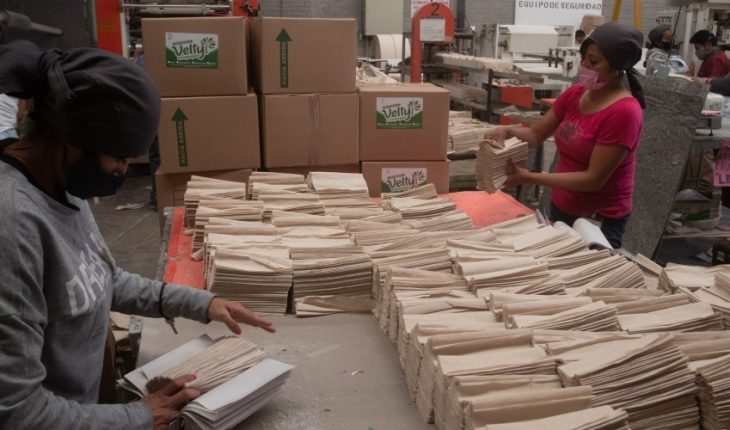The impact of COVID-19 with its arrival in the world was profound, in addition to the health crisis that this meant for humanity, in all economies globally the measures of social estating that led to one of the most pronounced global economic crises in history were resented. In particular, the labour market was one of the areas hardest hit by the pandemic, where millions of workers around the world lost their source of income, leaving millions of families in critical situations in the face of the closure of business, businesses and the sudden unemployment of certain economic activities that before the emergence of the pandemic were daily.
Specificly, in Mexico, throughout 2020 the occupied population lost a total of 3 million 252 thousand 64 workers, of whom 54.4% were Mexican workers. In other words, from December 2019 to December 2020, the total occupied population in the country fell (-)5.8%, where in the same period the departure of women from the occupied population fell (-)7.9% while in men the annual rate was (-)4.4%. This reflects that in aggregate the labour impact was greater for women than for men during 2020.
It is worth noting that although women’s participation in the occupied population has increased from 36% in January 2005 to 38% of the total occupied population in the country in January 2021, women were the most affected during the pandemic. In addition, there was a greater loss of jobs in the informal sector, which lost 60% of the total loss of 3.25 million, or 1 million 953,846 million people were no longer occupied in the informal sector from December 2019 to December 2020, of which 80% were women and only 20% male. These figures again reflect that it was women who lost their source of income the most over the past year in the context of the crisis.
It was not only Mexican workers who experienced the greatest loss in their jobs during 2020, but they were also the ones who were most vulnerable, with most of these women being employed in the informal sector, who do not have benefits or benefits or rights that by law protect them from unemployment. In addition to this, male workers who are insured by the IMSS predominate, on average in the last year, only 38% of the total workers registered in the IMSS are women and 62% remaining men. This is equivalent to saying that of the 19 million 821 thousand 651 insured workers, 12 million 208 thousand 860 are men and only 7 million 612 thousand 791 women. It is worth remembering that the loss in the jobs insured by the IMSS also reflected the depth of the pandemic havoc, as in April 2020 555 thousand 247 workers were removed from the register in the month and, in addition, 2020 closed with a total cumulative elimination of 647 thousand 710 jobs insured by the institution. During 2020 the total number of jobs registered with IMSS painted the #SemáforoEconómico of formal jobs of the organization Mexico, how are we doing? in red in 11 of last year’s 12 months.
In conclusion, it was not only women who experienced the greatest loss in their jobs, but also those who found the most vulnerable situation given the nature of their occupation and, if not enough, it was the occupied Mexican women who faced the greatest challenge in the face of the confinement measures in place to prevent the spread of the virus. That is, in the face of the closure of schools and the implementation of online classes, in addition to household chores, Mexican workers dedicated (in addition to their working day), 40 hours a week to the realization of these chores. In other words, women who did not lose their jobs had to devote the equivalent to a full working day in caring for children, home care, caring for the sick, among other activities, while men spent only 20 hours a week performing these tasks.
But the havoc of the pandemic for women in the country not only remained in the workplace, it was also Mexican women who fell into higher levels of labour poverty as a result of COVID-19. Nationally, labour poverty recorded significant increases during 2020: in the third quarter of the year the Mexican population found in this situation was 44.5% (the highest percentage recorded since data are available) and by 4Q2020 this proportion fell to 40.7%, however, it is 52 million Mexicans who are not yet able to acquire the basic food basket with the labor income of their home at the end of last year. This fact placed the #SemáforoEconómico of labor poverty Mexico, how are we doing? in red. Specificly, in the fourth quarter of 2020, of the country’s total women, 42% found the country in labour poverty, while of the total Mexican men 39% entered this situation.
All this shows that the outlook for Mexican women was more difficult than for the country’s men during the pandemic, and in addition to the latest JANUARY 2021 ENOEN data from INEGI reflect that the recovery has also been slower for Mexico’s workers. During the first month of the year, the occupied population lost a total of 883,825 workers, 90% of whom were women and 10% were men. In the face of this disparate situation for women in the country, in the context of an economic and health crisis that is not yet over, it is a priority that Mexican women are supported, which have been seen to a greater extent in more critical situations than Mexican men. It is time for support for Mexico’s mothers, sisters, daughters and workers who face an unequal environment of opportunity every day.
What we do at Animal Politics requires professional journalists, teamwork, dialogue with readers and something very important: independence. You can help us keep going. Be part of the team.
Subscribe to Animal Politics, receive benefits and support free journalism.#YoSoyAnimal





